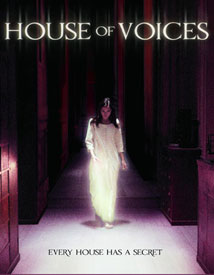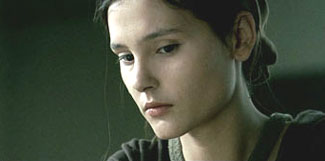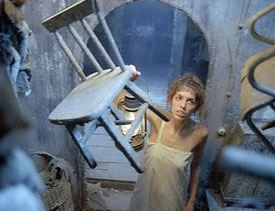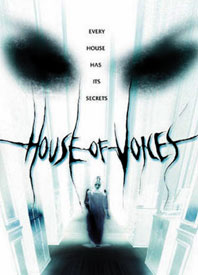 House of Voices (Saint Ange, 2004) has a spooky visually stunning conclusion, & if the bulk of the film had had anything like as interesting occurring, it could've been a great film.
House of Voices (Saint Ange, 2004) has a spooky visually stunning conclusion, & if the bulk of the film had had anything like as interesting occurring, it could've been a great film.
But the no-holds-barred supernaturalism of the ending doesn't fit the "maybe she's just nuts" tone of the main body of the film. It's like if Henry James had tacked on dragons & space aliens to the end of "The Turn of the Screw," spoiling all chances of having written a classic.
In the French Alps, young pregnant Anna (Virginie Ledoyen) arrives at a large Catholic orphanage that is being closed down but will need a skeleton staff to keep the estate tidy. Although everything is French in the story, this is a magical French place where everyone speaks English. The setting is "timeless" & easy to miss that it's supposed to be taking palce in the late 1950s (you have to ignore briefly glimpsed later model motor vehicles).
All the children are being put on busses & removed to a new orphanage, except for one young woman, Judy (Lou Doillon), who is not entirely in her right mind, so was never able to be adopted. She just grew up & continued to live at the orphanage, which Judy regards as "a children's paradise," & she has remained in some ways still a child.
No one seems quite sure what to do with her since she's can't live on her own, so the few remaining caretakers of the building just look after her.
As the children are being taken away, one little girl runs up to Anna & whispers in her ear, "Beware of the scary children." All old buildings tend to have stories attached to them of ghosts, & Saint Ange's is no exception.
Helenka (Dorina Lazar) is an older woman who oversees Anna's work, takes care of Judy, & generally cooks & cleans. She has worked at Saint Ange's since the war. Anna, from an increasingly paranoid point of view, comes to believe this kindly earthmotherly woman keeps terrible secrets about the orphanage's history.
 Anna's warped perspective induces the viewer, too, to expect Helenka to turn out to be dangerous or abusive, & though she never that, she does keep secrets. Anna's warped perspective induces the viewer, too, to expect Helenka to turn out to be dangerous or abusive, & though she never that, she does keep secrets.
Anna binds her belly & is under the mistaken impression she's successfully hiding her pregnancy. But everyone knows. She's not entirely stable, clearly, so we're left to wonder if she is concocting a personal worldview about Saint Ange without any basis in reality. Or is she weirdly sensitive to an authentic haunting?
Already convinced Helenka is hiding something monstrous, she becomes further convinced that Judy is being drugged into her mental illness, & colludes with the young woman to get her off her medications, under the belief that if she could get her mind clear she could reveal all the secrets of Saint Ange. Not until she bashes in Helenka's head are we certain (but not permanently certain) Judy should never have gone cold turkey off her meds.
Judy is protrayed splendidly, & just as it's hard to tell if Anna is rational or not, it's also hard to tell if Judy is or isn't becoming more clearheaded when secretly off her medication. What seems increasingly clear, however, is that there are no real ghosts, & only Anna experiences them.
There is nevertheless a cruel unspoken history about the mountain fortress of an orphanage, wartime deprivations resulting in deaths of a great many children at the very least. Yet Anna has her perspective & cannot change it; everything she discovers seems to lend credence to her conviction that outright warcrimes have resulted in a malignant haunting of the estate.
Because the film isn't well written it's up to the viewer to impose sense on a lot of what occurs. It seemed to me, if only briefly, that Judy was getting "better" off her medications, while at the same time Anna, who for a while seemed largely normal, gets loonier as Judy gets better. This convergence of their personalities seemed significant, though this possibility never added up to squat, & seems an accident of sloppy writing especially as Judy isn't getting better even though at the end she's better after, we don't entirely learn how or why.
 The fact that Anna doesn't want her illegitimate child, & has come to work at a closed orphanage, likewise has apparent psychological & symbolist weight. The fact that Anna doesn't want her illegitimate child, & has come to work at a closed orphanage, likewise has apparent psychological & symbolist weight.
Once I stopped expecting the ghosts to be real, it became more interesting as a study in subtle madness; & the adventures of two conspiratorial crazy girls almost becomes alluring. However, the ghosts are real -- probably.
The damned film just can't decide if the psychology of the thing or the supernatural is at the base of things, just like it can't decide if Judy should or shouldn't be medicated. The script had no clear vision & so the film is inartistically murky.
Anna increasingly convinced of some past hideous crime against children searches & searches until she finds a secret room behind the large mirror in the childrens' shower room. Breaking the mirror, there's a definite Alice through the Looking-glass feel to the entire final reel of the film.
[SPOILERS ALERT!] At the end of the secret room is a dumwaiter into which Anna climbs though Judy warns her not to. She descends for what seems like infinity into an underground world of pure whiteness.
This is entirely dreamlike & surreal & we have to assume it's hallucinated since such a world of white cleanliness could not exist. It's a nightmare dreamscape with padded cells & evidence of experiments, never quite adding up to anything sensible, having only the logic of dream.
This is all quite beautifully staged even if it doesn't seem to be related to events leading up to the discovery of the subterranean "ward," still well-lit & sterile despite having been abandoned since the war. Then into this dreamscape pitiable, headshaven children intrude, surrounding Anna as she writhes on the floor in a welling pool of her own blood, as her infant is stillborn.
There are two codas to this climax. In the first coda we are shown conclusively that it was all a dream: Anna never went deep into the earth but was in a dark, dirty room where she died giving birth to a dead child. She's shown as a macabre madonna with child, curled up together on the filthy floor.
But in the final coda, Judy is shown still to be off her meds, & definitely more clear-headed than ever she had been in her life, & ready to move on & away from Saint Ange. She takes a final look around, & discovers the ghostly madonna feeding her ghostly infant, surrounded by the war-dead of Saint Ange. This final image is gorgeous. And by its weird beauty it almost but not quite disguises the misguided nonsensicality of the story. [END SPOILER ALERT]
Prettily filmed, but reminiscent only of Masterpiece Theater, the film is glacially paced, frequently dull, obviously intended to be artful, but achieving the level of a Lady's Gothic of the type that in old paperbacks always showed a frightened young woman on the cover running away from a burning mansion. It reeks of the trivial, but if one adores Masterpiece Theater telefilms, this one has all that plus the misfitted weird ending.
copyright © by Paghat the Ratgirl
|

